You have read about “the good” Islamabad in Part 1 of this post, which, it seemed from the comments, sent some of you reminiscing about the Islamabad that you knew. Well, here is the not-so-good and the ugly side of Islamabad as seen by me and my camera.
In Part 1 of this series on Islamabad, I had said that there were certain things that ‘self-respecting’ Pakistanis won’t do. Riding a bicycle and carrying anything heavier or larger than a briefcase were two of them. I would like to add one more thing to this list: no proud Pakistani would like to be seen stopping or slowing down his/her car at a crosswalk or ‘zebra crossing’ to allow a pedestrian to cross the road peacefully. Even the cars that are turning from a side street would barrel down at the pedestrians forcing them either to run for their lives – literally – or scurry back to safety.
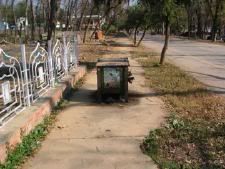
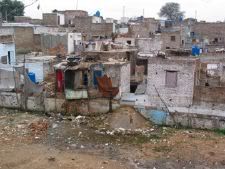
I find it ironic that on the one hand we take so much pride in our cultural values of courtesy, hospitality, lehaaz and “pehlay aap” – and often flaunt them – and on the other hand the moment we get inside a car we toss all those values out, just as we routinely toss candy wrappers and other trash out of our car windows. I have never understood this sudden transformation.
But come to think of it, many of the crosswalks in Islamabad often end up nowhere, anyway –some against a high road divider and others in a ditch. Yes, in a ditch, as can be seen in the pictures here. So, if even you escape the speeding car you may end up tripping over or, worse, in a ditch!
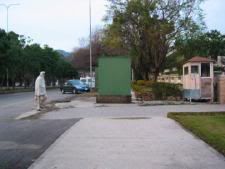
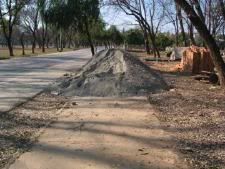
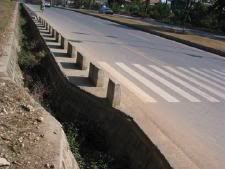
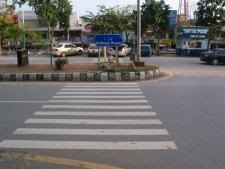
Another thing that would frustrate a newcomer to the town is the lack of adequate and continuous sidewalks. An advertisement supplement on “Destination Pakistan 2007” in last Sunday’s Daily Times boasts:
The master plan of this most modern city was prepared in 1960. Islamabad is one of the few planned cities of the world… It is a modern and a carefully planned city, with tree-lined streets, large houses, elegant public buildings and well organized bazaars.
Yes, it has tree-lined streets and large, in fact very large, houses but this “most modern” and “one of the few planned cities of the world” does not have adequate sidewalks. The sidewalks that are there in the “prestigious” E and F sectors are often blocked by construction material dumped on them and cars parked on them (who said there were no idiots in these sectors?) or, as if this wasn’t bad enough, large transformers installed in the middle of sidewalk by WAPDA. The Greek planners of the city obviously did not factor in Wapda’s ingenuity when planning the city.
It’s a bit ironic that the people, who invented the automobile and manufacture and use it in millions, always build adequate sidewalks for foot traffic in their cities and keep the sidewalks unobstructed both for able bodied as well as for disabled individuals and their motorized or manually pushed chairs. And we, who acquired automobiles relatively recently, totally ignore the need of pedestrians, let alone those of the handicapped.
You cannot see or appreciate a city while driving – or reading about it in newspaper supplements. To take in the sights, sounds and smells of a city you have to be able to walk around without the fear of tripping over, falling in a ditch or being run over. And one finds it very difficult to do that even in Islamabad – “one of the few planned cities of the world”. With all those hurdles placed in one’s way, one has to be a kangaroo to be able to walk around the city. The city planners obviously overlooked something very important and elementary.
Barring the frustration a pedestrian has to go through, Islamabad is mostly a clean city – in fact, very clean by Pakistani or third world standards. Its streets are regularly swept; its drains and sewers rarely overflow; the domestic trash is dutifully picked up from in front of the houses and deposited in the garbage bins and, before the bins start overflowing, they are emptied by garbage trucks.
And who does all this “dirty work”? An army of sanitary staff, men and women, distinguishable by the yellow jackets they wear as their uniform, is employed by the Capital Development Authority (CDA) to keep the city clean. Theirs is one of the most arduous jobs and they provide one of the most essential services a city has to have to survive. Incidentally, Islamabad will not know the difference if all the government offices were closed for a week or so, which they actually are during Eid and Muharram holidays. But if the sanitary workers stop working for a week the city will turn into a garbage dump. Despite that they are the lowest paid and most discriminated of the City employees.
It is very ironic that these workers, who keep the city clean and running, themselves live in squalor in some of the worst slums in most unhygienic conditions – right in the middle of two of the prestigious sectors (F-6 and F-7). Their houses consist of clusters of shanties without adequate drainage or dependable water, power and gas supply. The City has tried to hide these slums from the surrounding localities by building high walls around them, just as one would try to mask a blemish on his/her face. But, is that a solution?
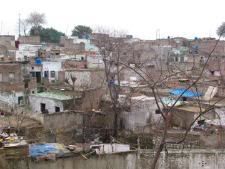
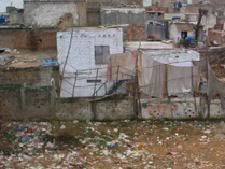
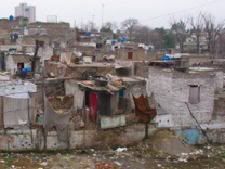
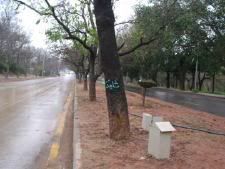
One wonders, why can’t the City, which spends billions of rupees on widening the roads, building public buildings and government housing, playgrounds, parks and expensive monuments (some of them totally wasteful) can’t provide low cost housing to these employees? Something on the lines of Project Housing in New York city or other cities of the world.
Since majority of these workers happen to be Christians they are doubly discriminated. They are excluded from receiving any Zakat money from the government collectively or individually. Private Muslim charities also exclude them for religious reasons. Nor do they even receive sacrificial meat on Eid al-azha.
Very close to the shanties, at a higher level, there is a beautiful, tree-lined, dual carriage road. Nailed to the trees are green metal plates, each bearing one of the attributes of God and the Prophet. Such names and other religious writings were nailed to the trees and lampposts in Islamabad, as in many other cities, in a spate of conspicuous religiosity that hit Pakistan in the last 20 years or so. Included among the sacred names are also al-Rehman (the beneficient), al-Razzaq (the provider) and al-Karaim (the bountiful and generous). I wonder if the people in the shanties who also keep this road clean ever noticed these names and their significance.
Note: Part 1 of this article here. All photographs by author.




















































[quote post=”588″]Another bad part that I had experienced which is “Never visit Islamabad during the Eid dayâ€
[quote post=”588″]no proud Pakistani would like to be seen stopping or slowing down his/her car at a crosswalk or ‘zebra crossing’ to allow a pedestrian to cross the road peacefully. Even the cars that are turning from a side street would barrel down at the pedestrians forcing them either to run for their lives – literally – or scurry back to safety.[/quote]
That’s odd. I don’t see that happening much these days except by “shikra’s” of Islamabad driving Land Cruisers. I myself am living proof in contradiction to your statement since I stop my car to allow others to pass for this exact reason that I remember the time when I used to walk and people used to drive, though it was more due to my age than anything else. Does this means I am not Pakistani? How can this nation progress if we ourself have such lowly stereotypes about our own people? People do wrong and violate the law but stop and think for one second before labelling all the people with one sweep of the brush.
[quote post=”588″]But come to think of it, many of the crosswalks in Islamabad often end up nowhere, anyway –some against a high road divider and others in a ditch. Yes, in a ditch, as can be seen in the pictures here. So, if even you escape the speeding car you may end up tripping over or, worse, in a ditch![/quote]
A bit exaggerated. You ignore the many other sidewalks and crossings that are perfectly OK. Te only problem I see is for the disabled and IMO, that needs remedial action quickly. It is the failure of CDA to look at these things. New additions to infrastructure ignores seamlessly merging the old infrastructure with the new one as can be seen in the picture of the ‘ditch’. About the blockage of crossings/sidewalks, it is the lack of civic sense in the residents of those places to dump the construction material on the sidewalks and on roads. I would fully support any initiative by the CDA to fine these people heavily.
Personally, I see a lot of improvement over the years as a resident rather than a visitor. There used to be a lack of sidewalks some years back. There were protests lodged with the CDA regarding this and now the sidewalks have been made on many inner streets of sectors like G9, etc. CDA is doing the work, albeit at a very slow pace. Still, comparing to some years back, there has been a lot of improvement though there is still room for more.
[quote post=”588″]One wonders, why can’t the City, which spends billions of rupees on widening the roads, building public buildings and government housing, playgrounds, parks and expensive monuments (some of them totally wasteful) can’t provide low cost housing to these employees? Something on the lines of Project Housing in New York city or other cities of the world.[/quote]
Agreed. Over the span of many years, these people have lived in the same place and the authorities need to seriously consider providing them with better facilities and a place for living. This would indeed make for a positive change in the city.
[quote post=”588″]Since majority of these workers happen to be Christians they are doubly discriminated. They are excluded from receiving any Zakat money from the government collectively or individually. Private Muslim charities also exclude them for religious reasons. Nor do they even receive sacrificial meat on Eid al-azha.[/quote]
I am not in the know about the Zakat or the charity issue so I won’t comment on that. However, your claim about sacrificial meat on Eid is conditionally [mostly] false. It depends entirely on who you are dealing with. The people who do not care for this religious divide, treat these workers equally. Indeed, I have seen many such Christian workers receive meat on Eid, get money for Christmas as ‘Christian Eid’ and even on Easter. Others who discriminate against them due to their status, religion or any other reason do the same with the Muslim workers too. These so-called Muslims have stereotypes and “we are above the others” mentality which is a hindrance to them and others and causes the discriminatory behaviour.
“It’s a bit ironic that the people, who invented the automobile and manufacture and use it in millions, always build adequate sidewalks for foot traffic in their cities and keep the sidewalks unobstructed both for able bodied as well as for disabled individuals and their motorized or manually pushed chairs. And we, who acquired automobiles relatively recently, totally ignore the need of pedestrians, let alone those of the handicapped.”
Excellent observation!
Another bad part that I had experienced which is “Never visit Islamabad during the Eid day”. Being a Karachite living in Islamabad which is quite a bit far from Karachi and sometimes you end up staying in Islamabad in Eid. I would say that you could easily hear owls howling on that day. You can see that on Eid day, the whole city is deserted unlike Karachi or Lahore since most of the residents would go to their nearby home cities where they originally came from to celebrate the Eid. The city has still failed to establish the sort of identity which other cities have attained over the years obviously probably because it is not that old of a city.
[quote post=”588″]we take so much pride in our cultural values of courtesy, hospitality, lehaaz and “pehlay aapâ€